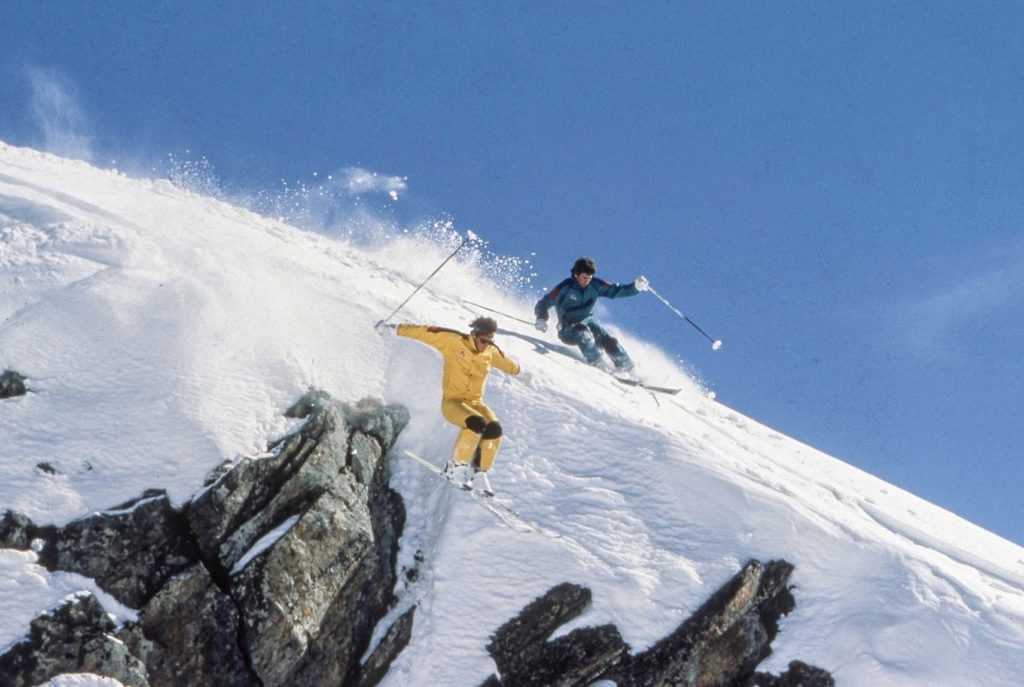By Dan Egan EBS Contributor
This article is an excerpt from Thirty Years in a White Haze.
In May of 2000, my brother John and I were in northeastern Canada on the frozen coast of Ungava Bay on the Arctic Ocean in Nunavik in a blinding windstorm. I had been separated from my group and was seeking shelter from the wind against a big piece of ice. John, Dean Decas and cameraman Eric Scharmer were with the Inuit guides, a hundred or so yards away. I was shaking from a flashback of being lost in a snowstorm on Mount Elbrus in Russia, ten years earlier.
We were on a 20 day trip to make a television documentary on adventure tourism in northern Quebec. Our main goal was to ski Tower Mountain, a stand alone, sphinx-like pyramid on the border with Labrador. A year earlier, John and I had spoken about a reunion trip back to Mount Elbrus but decided a new adventure would be a better than going back to the site of such tragic loss.
However, here I was hunkered down in another wild storm—scared, unable to find my way in the Arctic, remembering Elbrus where I was trapped for over 38 hours, lost in the storm that killed a dozen climbers on Elbrus.

Since the mid 1980s, John and I built a reputation for skiing the world’s most remote locations. We traveled throughout the Eastern Bloc at the end of the Cold War, skied with Kurds in Turkey during Desert Storm, pioneered heli-skiing in Chile, skied the Martial Glacier above the Drake Passage on the southern tip of Argentina and snuck into Lebanon to ski in the mid 1990s.
This was how I found myself on Mount Elbrus, Russia pinned down by a massive snowstorm, at 18,500 feet above sea level. Elbrus has a higher annual death toll than Mount Everest—there were eleven deaths on Mount Everest in 2019, one of the deadliest years in the mountain’s recorded climbing history. As recently as 2016, thirty climbers were estimated to have died in attempts on Elbrus in a single year. In 2004, 48 perished trying to reach the summit.
My brother John was far below in the storm raging on Elbrus back in May of 1990. We had traveled there with an expedition consisting of 23 people from nine countries.The expedition was coordinated by Degré7 skiwear and the plan was we would hike up the eastern peak, then ski down. So far, it wasn’t going well. May 2, 1990 would become one of the most disastrous days in the mountain’s climbing history.
On the night of May 1, a storm raged briefly, but broke by morning. So, with the skies clearing above, I left John behind and made way for the top, it was a decision that would ultimately, leave me stranded.
“The storm came up from the bottom of the mountain and only getting worse,” John would later say.
But the storm had yet to reach me, I was climbing with Alfred Jimenez-Segarra, a Spanish member of the expedition as we approached the summit, we dropped our packs to lighten our load.
On the summit we soon were blanketed by the storm. Luckily, we were not alone. A Russian guide who introduced himself as Sasha convinced us to come with him and his fellow Russian climbers.
The situation grew worse. One of the climbers fell through a crevasse, forcing Sasha and I to rescue him. As the storm grew it became everyman for himself, after digging for four and a half hours, I laid down in my snow cave. Snow was piling up outside, winds reached 100 miles an hour, I was vomiting blood and began experiencing hallucinations.
That night I pondered my life. When it came to my ski career, I wanted to blow it wide open into something bigger, this ultimately brought me to Mount Elbrus, facing death, dealing with the realities of my career choice.
In the end Sasha and I rescued 14 people and arrived at the base of the mountain at midnight on May 3, 1990. The 1990 Degré7 expedition deeply affected my life it formed internal reactions I couldn’t control for years afterward.
Walking off that mountain it was the beginning of my adult life as I know it today. Looking back, I was 26 years old, and I’ve come to realize that skiing almost killed me and saved me, all at the same time.

Extreme Skiing Pioneer, Dan Egan coaches and teaches at Big Sky Resort during the winter. His steep camps run Feb. 25-27, March 4-6 and March 11-13. His newest book, Thirty Years in a White Haze will be released in February, for pre-orders visit www.White-Haze.com for autographed copies.













